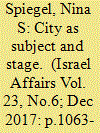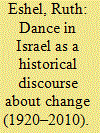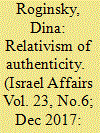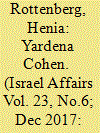| Srl | Item |
| 1 |
ID:
155051


|
|
|
|
|
| Summary/Abstract |
This article investigates the impact of dance on the development of Tel Aviv during the British Mandate of Palestine. It shows how theatrical, salon, and folk dance forms shaped the culture as well as the physical space of the burgeoning city, and how national ideas were encoded into this nexus. The city served as both stage and subject of dancing and choreographic activity.
|
|
|
|
|
|
|
|
|
|
|
|
|
|
|
|
| 2 |
ID:
155052


|
|
|
|
|
| Summary/Abstract |
Teaching dance in early childhood education in the national-religious community (NRC) is a relatively new phenomenon in Israeli society. This article describes teaching practices that religious dance teachers create and use to bridge the divide between Jewish tradition and dance. The research is based on an ethnographic observation of dance classes in schools. Through analysis of a typical class, this article illustrates how the teachers have formed a unique dance class structure: the dance midrash.
|
|
|
|
|
|
|
|
|
|
|
|
|
|
|
|
| 3 |
ID:
155048


|
|
|
|
|
| Summary/Abstract |
This article discusses the evolution of concert dance in Israel from the 1920s to the current blossoming of the 2010s. The way dance in Israel has evolved reflects the many changes in Israeli society, including ideological, social and political changes, as well as influences of dance genres from abroad, globalisation and post-modernism. The article argues that the engines that have driven dance in Israel along the timeline are change and choices.
|
|
|
|
|
|
|
|
|
|
|
|
|
|
|
|
| 4 |
ID:
155053


|
|
|
|
|
| Summary/Abstract |
This article examined, for the first time, religiously observant female dance teachers who take part in shaping a new path in dance instruction in a Jewish religious spirit within the Israeli general-religious education system. The article examined the connections between the teachers’ perceptions and positions on aspects related to their professional world, and between their commitment to, and satisfaction from, teaching. A total of 119 teachers participated in the study. The findings show that a predictor for satisfaction and commitment is the perception of reciprocation between teacher and the teaching profession, while commitment is also predicted by the intrinsic personal motivations.
|
|
|
|
|
|
|
|
|
|
|
|
|
|
|
|
| 5 |
ID:
155050


|
|
|
|
|
| Summary/Abstract |
The early Zionist pioneers adopted the Hora dance as an expression of their special experience, and saw it as a (quasi-)religious expression of themselves. This article studies the way Hora was conceived as a symbol and a ritual mainly in the lyrics of dance songs. Hora dancing is seen through the lens of lyrics as a rite of passage in the liminal situation characteristic of both the young immigrants and the historical moment as they saw it. The Hassidic background of the dance is highlighted through the charismatic leadership of A.D. Gordon’s dancing and Y.H. Brenner’s Hassidic-like sermons. The attitude expressed in lyrics is not Hassidic and surprisingly nor is it optimistic Zionist idealism. An interpretation of the main motives in lyrics infers a rather existentialist attitude adopted in order to face a difficult day-to-day working life. Being an expression of a past liminal experience, Hora appears in some lyrics as an object of a nostalgic expectation, as a part of an attempt to institutionalise it as a symbol of national identity.
|
|
|
|
|
|
|
|
|
|
|
|
|
|
|
|
| 6 |
ID:
155054


|
|
|
|
|
| Summary/Abstract |
Israel is arguably a place where music-centred ‘trance-dance’ parties have attained their highest degree of national/cultural prominence, with these events being extremely popular in secular communities and even among Orthodox youth. Based on findings from ethnographic research, the article compares the core features – settings, participants and conduct – of trance parties for secular and Orthodox Israeli youth and examines the functions they perform for each group of partygoers. The findings point to variances in the cultural and personal needs that participation in trance parties fulfils for these disparate communities, which, accordingly, are reflected in their contrastive features. At the same time, both communities of partygoers paradoxically reproduce the very same attitudes and practices their participation intends to challenge, demonstrating that, unlike in other countries, the consumption of psychedelic electronic dance music culture in Israel is essentially devoid of subversive intentions.
|
|
|
|
|
|
|
|
|
|
|
|
|
|
|
|
| 7 |
ID:
155056


|
|
|
|
|
| Summary/Abstract |
Relying on historic and ethnographic fieldwork, this article traces the development of the Israeli folk dance movement in Israel and the United States over the last century. Israeli folk dances are consumed worldwide and especially by American Jewry precisely because they are perceived as an authentic expression of national Israeli culture, even as their authenticity is continuously contested and re-evaluated in different historical and cultural contexts and by various actors who engage in their preservation and re-creation. The result is an intricate articulation of an ideological and rhetorical debate on authenticity, which reveals its relativistic character and sheds light on the cultural negotiation of identity between Israeli and American Jewry.
|
|
|
|
|
|
|
|
|
|
|
|
|
|
|
|
| 8 |
ID:
155049


|
|
|
|
|
| Summary/Abstract |
Yardena Cohen (1910–2012), a dancer, choreographer and teacher, is considered one of the founding mothers of Hebrew dance. After studying in Austria and Germany, Cohen began developing her dance career in the early 1930s in Mandatory Palestine by creating and performing solo dances, and later on by creating festivities for the kibbutzim and teaching dance. This article investigates Cohen’s unique action and contribution to the development of Hebrew culture within the context of shaping and formulating a nation-state and a national culture for the new Jewish Yishuv. By way of doing so, it will explore Cohen’s employment of ancient materials stretching back to biblical times combined with formal frameworks inspired by German dance expressionism in an attempt to determine whether and to what extent she conformed to the Yishuv’s ideology or found a way to express her unique, and sometimes non-conformist, voice.
|
|
|
|
|
|
|
|
|
|
|
|
|
|
|
|